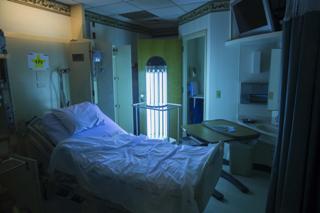Oct 8 2015
Healthcare facilities continue to battle drug-resistant organisms such as methicillin-resistant Staphylococcus aureus (MRSA) that loiter on surfaces even after patient rooms have been cleaned and can cause new, sometimes-deadly infections.
 During the trial, a Tru-D SmartUVC machine was used in combination with chemical agents to disinfect patient rooms. This is a machine at Duke University Hospital, one of the trial hospitals. Credit:Shawn Rocco/ Duke Medicine
During the trial, a Tru-D SmartUVC machine was used in combination with chemical agents to disinfect patient rooms. This is a machine at Duke University Hospital, one of the trial hospitals. Credit:Shawn Rocco/ Duke Medicine
UV light disinfects hospital room
But a new study from Duke Medicine has found that using a combination of chemicals and UV light to clean patient rooms cut transmission of four major superbugs by a cumulative 30 percent among a specific group of patients -- those who stay overnight in a room where someone with a known positive culture or infection of a drug-resistant organism had previously been treated.
This group of patients represented about five percent of more than 600,000 patients across the study hospitals. Duke researchers will present the findings in San Diego on Friday, October 9, at ID Week, an annual meeting of infectious disease experts from around the world.
The randomized trial was conducted at nine hospitals in the Southeast from 2012 to 2014, including three Duke University Health System hospitals, a Veterans Affairs hospital, and several smaller community healthcare centers. The trial studied how three cleaning methods affected the transmission of four drug-resistant pathogens: MRSA, vancomycin-resistant enterococci (VRE), C. difficile and Acinetobacter.
"Some of these germs are hardy and can live on the environment long enough that even after a patient with the organism has left the room and it has been cleaned, the next patient in the room could potentially be exposed," said Deverick J. Anderson, M.D., an infectious disease specialist at Duke Medicine and lead investigator of the study. "Several groups have demonstrated that enhanced cleaning strategies such as using portable UV machines can kill these germs, but this is the first well controlled study that shows these techniques can make meaningful difference in patient outcomes."
The standard approach for room cleaning involves the use of a quaternary ammonium disinfectant, or "quat." Participating hospitals used three methods for killing the germs: irradiating the room with UV after using a quat, replacing the quat with bleach, and replacing the quat with bleach and irradiating the room with UV light. The researchers found that the most effective strategy was to proceed with standard disinfection quats, followed by a 30 to 50 minute cycle with a portable UV irradiating machine.
"The staff would open drawers, open doors to the bathroom, roll the machine into the center of the room," Anderson said. "UV light works through reflective properties, killing organisms even in the shadows if there is space for light to reflect. The light disrupts the DNA of these germs and kills them."
In the specific subgroup of patients who were studied, the method resulted in an almost one-third cumulative reduction in acquiring any of the four superbugs or developing infections in the following three months, the researchers found.
"This study provides strong evidence that enhanced environmental cleaning can help reduce transmission of dangerous germs to a specific group of at-risk patients", said John A. Jernigan, M.D., an expert on healthcare-associated infections with the Centers for Disease Control and Prevention (CDC). "The findings represent an important step forward in understanding the role the hospital environment plays in transmitting infection, but we still have a lot to learn about the impact this specific type of intervention will have for the entire population of hospitalized patients."